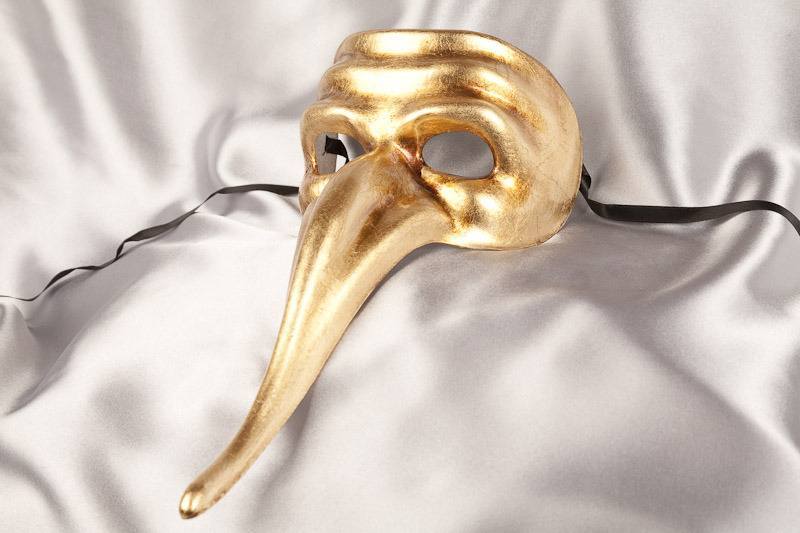
SCARAMOUCHE – AN UNSCRUPULOUS RASCAL
April 13, 2022
PIERROT OR PEDROLINO – THE SAD CLOWN FROM COMMEDIA DELL’ARTE
August 1, 2022From Venetian merchant to distinguished nobleman, Pantalone is one more rapacious stock character from the Commedia dell’Arte.
Rich, cunning, and exceptionally greedy, he is instantly recognizable and occupies one of the top positions in the pecking order of the static characters.
IDENTITY AND APPEARANCE
Pantalone is educated, upper-class and well-to-do.
He sees himself as a ‘Don Juan’ character, flashing his expensive rings and flaunting his strategically-placed coin pouch to all and sundry.
In his mind, he is fit as a fiddle, muscular and virile, much more desirable than the hunch-backed old man of reality. A weakness for pretty young women sees him lusting after them at every opportunity although, unfortunately for him, his advanced years and pretensions to grandiosity result in the women finding his flirtations hilarious, reducing him to a laughing stock.
Pantalone has a habit of assuming false personas or titles to further his avarice and amorous entanglements. In early depictions, he looks undernourished and poorly dressed, belying his great wealth.
His regular costume, however, is designed to comically entertain with its bawdiness as he apparently attempts to hide insecurities about his virility.
Dressed in a pair of tight-fitting crimson hose, red top, a pleated black ankle-length cassock, soft skullcap and yellow Turkish slippers, and sporting a disorderly white goatee, Pantalone wears an ostentatious codpiece, a type of pouch worn to cover and emphasize his manhood.
A daring fashion accessory amongst the rich, the ranked, and the royal, this protuberant jockstrap-like creation was favoured in the 15th and 16th centuries by young Venetian males who were preoccupied with erotic displays that showed off their sexual strength and virility. Hardly a suitable choice of adornment, you might think, for an old hunchback man like Pantalone.
Later versions of the character sometimes have him dressed in long trousers or ‘pantaloons’ (the word was coined from his name). Other variants have him wearing red knee-breeches to show off his scrawny old legs, and occasionally he carries a walking stick or a sword, with a gold medallion now complementing his coin pouch.
ORIGIN
The roots of the name ‘Pantalone’ remain undetermined.
He is indeed a character of the Venetians but it is not known if his name derives from ‘Saint Pantaleon’ (‘San Pantalone’), a popular saint in Venice, or from Venetian merchants called ‘Piantaleoni’.
Another theory traces his name to a Greek expression ‘Powerful in all things.
What is certain is that he is one of the four primary Commedia dell’Arte characters, and was the original il Magnifico stock character – an old merchant. A 17th century description of Pantalone, ‘ puer centum annorum’, translates into ‘hundred-year-old boy’, suggesting that the early interpreters of the role of Pantalone were vigorous young men.
MASK
Pantalone’s mask is described as a dark brown or blackish half-mask, gaunt-looking with a large protruding nose. It particularly looks formidable due to Pantalone’s unruly white bushy eyebrows and sparse pointed beard, which shakes ridiculously every time he speaks.
He occasionally wears spectacles characterised by large round horn rims, making him appear even more intimidating.
CHARACTER AND PERSONALITY
Whether depicted as rich or poor, as a bachelor, married or widowed, Pantalone is invariably crotchety, stern, lustful, jealous, deceitful, selfish, and full of himself, but above all he is greedy.
Time and again the character of Pantalone degenerates from that of a noble citizen to a ‘debased citizen-merchant’. He assumes everything can be bought and sold and, when things don’t go his way (as they inevitably don’t in Commedia), he quickly becomes enraged and interferes in the happiness of others.
Pantalone controls all the money in Commedia and he becomes terrified when he has to part with any of it. Driven by greed and a lust for wealth, he is stingy in the extreme, and his only ambition is to further his financial interests. Despite his avarice and rapaciousness, the audience sees a petty, unforgiving, cheap and gullible merchant from Venice who is attempting to disguise his age through his ludicrous costume.
Pantalone’s role is usually spoken entirely in the Venetian dialect.
ACTIONS
Pantalone is usually the father to one of the Innamorati (the lovers), another stock character found in Commedia. While scheming to keep his daughter and her lover apart, Pantalone constantly tries to bully her into marrying a wealthy man so as to avoid giving her a dowry.
However, with the assistance of some astute and entertaining servants, the Innamorati manage to fool Pantalone. As a result, he starves his servants, discharging them before dinner to ensure they suffer even more.
For most of his time on stage, Pantalone’s comedy arises from the contradiction between the excitability of his actions and the impotent senility of the character being portrayed.
Despite his lewd and disrespectful attitude towards women, leering and subjecting them to sexual harassment, he is in fact old and incapable, constantly frustrated at being a subject of mockery.
After a lifetime of saving money, Pantalone has no intention of parting with it and he continually grasps at the pouch near his groin to reassure himself that his money is safe.
The hunch-backed position he assumes is for the protection of his money and he is oblivious to the fact that this only contributes further to his apparent frailty.
His hands (which he can’t keep to himself) flutter continuously, gesticulating with each thought that comes into his head. The only way he can stop this is to hold them behind his back, tucked beneath his cloak.
SUMMARY
As long as Pantalone remains onstage, nothing but raucous laughter will be heard from the audience.
A grotesque older figure who fails in all his schemes (the Innamorati end up getting married), his role nevertheless succeeds in re-inventing itself for each successive generation, dressed in the youthful fashions of the day and providing a character that the audience loves to hate.
They are often privy to his schemes and fantasies as he mutters to himself onstage, while he gives voice to the darker side of the male consciousness, a secret hero to the less enlightened men in the audience.



